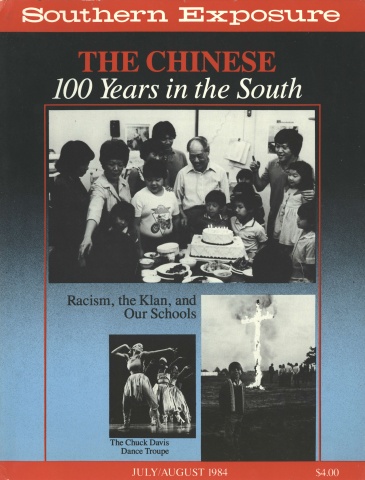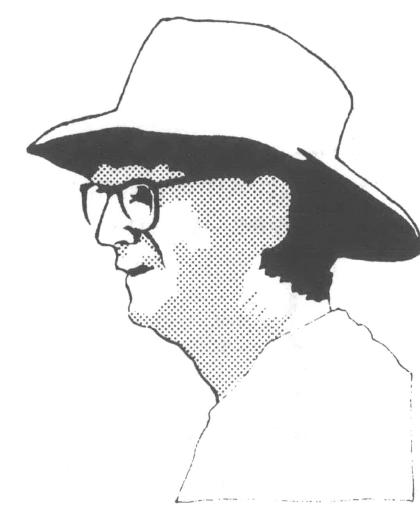
This article originally appeared in Southern Exposure Vol. 12 No. 4, "The Chinese: 100 Years in the South." Find more from that issue here.
HATCHBEND, FL — When 1983 faded away, John Thomas Earl faded away with it.
Often we search for superficial connections when we seek consequence in the death of a friend. With J.T. Earl, that is not necessary. More than any other man I have ever known, J.T. Earl lived a meaningful life, and the slow, honorable way he struggled over his 55 years of living gave meaning to his death.
J.T. Earl was born, lived, and died in a hardscrabble settlement called Hatchbend. There beside the Suwannee River, his ancestors had come years before Spain ceded Florida to the United States. So J.T. had a sense of belonging few of us have anymore. One of his great-grandfathers had been a penniless white wanderer seeking adventure. Another was a Seminole Indian chief. When J.T. Earl and I took walks around the region, he would point to tree stumps and riverbanks, explaining which of his forebears had done what at that spot. It was a heritage he loved to share.
Why J.T. Earl was so open-minded and accepting of strangers I never understood, but I suspect this had roots in his peculiar past. He was one-quarter Indian, and had suffered discrimination because of it. Once he told me the Masons refused him membership because of his Indian blood. This seemed to puzzle more than anger him.
I think that much of his tolerance, though, was the result of a horror he witnessed as a young man. When he was 16, he joined the military. World War II ended soon after he joined, but not before he was shipped to Hiroshima to help clean the rotting bodies in the aftermath of the atomic bomb drop. He didn't talk about the experience much, but when he did, you felt the years had done nothing to diminish his revulsion at what he saw. The children haunted him most, he said. He never forgot finding a schoolroom full of them, sitting still at their desks, their cheekbones jutting through the skin of their faces.
After the war, J.T. Earl had a hard time of it. He drank too much. He fought too much. He misused women. This passed somewhat — he was always basically a good, stable man — but he never resolved the contradictions completely. He liked to drink, so he did. He liked to fight, and he did. Eventually, though, he married a poor woman with whom he began to raise children.
The first children they raised were two orphaned boys. Later, they bore a son and daughter of their own. All his life, though, J.T. Earl continued to take in homeless children. He said, "I love having kids around. It's the bestest feeling they is." Something in his reverence for children suggested he had found a personal expiation for the horrors of Hiroshima.
J.T. Earl was a farmer, an outdoorsman. Yet he respected other pursuits. Once he told me proudly that his daughter was working on her doctoral degree. Actually, she was an undergraduate, but because she was the first of his line to attend college, degrees were new to him. To him, a Ph.D. was a degree. Bachelors were unmarried men.
J.T. Earl himself was probably a millionaire, if you added his many holdings and subtracted his few liabilities. But you would never have guessed that he even had a bank account. He lived in a tiny, clapboard house he had built himself. He wore faded jeans and an old leather hat, circa 1948. Most of the time he looked unshaved.
The last time I saw J.T. Earl he was dressed as poorly as usual, except that he wore a brand new T-shirt. He had invited me and a few hundred other friends — he was the type of man with friends of every station — to come to his land on the Suwannee for a special celebration he called "Cracker Day." He had cooked up beans, yams, com, venison, pork, chicken — all the foods he loved. He had trucked in musicians to play bluegrass — the music he loved. He had spent a good hunk of money to share all the things he loved with people he thought would appreciate them.
Later I learned that he knew then that he was dying — of a deterioration begun years before in the dead city of Hiroshima — and had planned Cracker Day as his public farewell.
When I heard that J.T. Earl was dead, I pulled out a snapshot of him taken on that day. In it, he was smiling, looking happy, surrounded by friends. That is a good way to remember him.
Tags
Raymond Washington
Raymond Washington is a journalist living in McIntosh, Florida. (1984)

